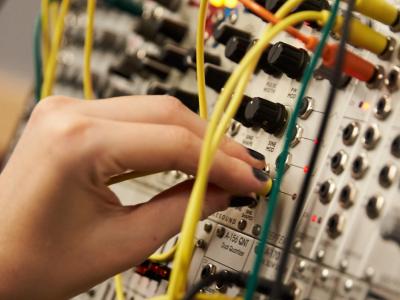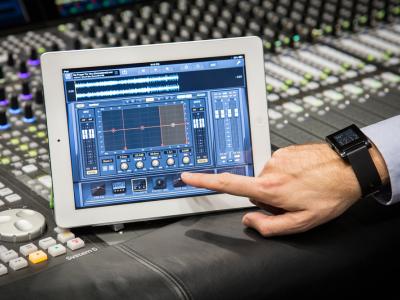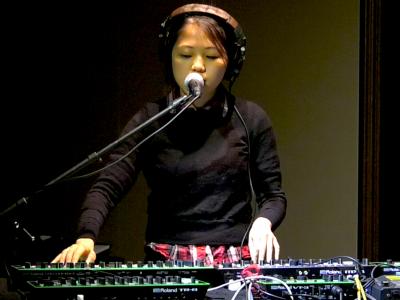What does a DJ (Studio or Performing) do?
Originally, DJs were hybrid curator-performers who would select and play sets of the day’s hottest records on turntables—the eponymous “discs”—and use complex analog techniques to tweak the music as it played. DJs still do all of this today—although the analog techniques have largely been replaced with digital software. While some DJs focus almost exclusively on setlist-building and nightclub performance and others are more production-oriented, most do a combination of both.
The traditional live DJ setup includes a mixer, two turntables, a sound system, and headphones, but a plethora of digital tools are now available to supplement this. Performing DJs may mix music on the fly, or use looping, effects, and other techniques to change the sound or structure of a track. Often, they create a seamless and thrilling flow by manipulating intros and outros, matching tempos, keys, and audio levels, and generally smoothing out transitions. DJs today fill many roles, including performer, manager, accountant, promoter, and social media coordinator.
There are several opportunities for specialization as a DJ:
- Club and Festival DJ: A producer/DJ focused on playing long two- to three-hour sets featuring genre-specific selections. These DJs often create original music and remixes and integrate live remixing and production elements as well as augment their shows with custom/creative video content and lighting, in addition to running sound for performers. They push the limits to create engaging performances for fans drawn to their particular style of music or originality in mixing. Livestreaming DJing has more recently increased in popularity, offering audiences a live experience from their homes.
- Mobile DJ: These DJs perform at events such as weddings, parties, and other celebrations, and are focused on playing long gigs that last the whole night or the duration of the event featuring crossover (mainstream and pop) selections. Fans appreciate their ability to curate a mix of popular music from different genres. Like the club and festival DJ, mobile DJs can run sound for performers.
- Turntablist: Focused on playing short routines (six minutes) for competitions, turntablists use the latest gear and performance techniques such as beat mixing/matching, scratching, and beat juggling, often in concert-style settings. They can manipulate their equipment to function as a musical instrument and create new music from existing sounds for live remixing. They may even be members of a band. Their audience is impressed with their technical ability and creativity.
- Radio/Podcast DJ: These DJs work in a prerecorded mix format, with podcasts being a natural extension for this specialization. They create a mix for listeners, blending the audience’s favorite styles while introducing them to new music. DJ podcasts provide an opportunity to reach a wider audience and engage with fans, as well as promote music and events.
At a Glance
DJs need drive, skill, and great musical sense. Training in electronic performance, live DJs might start out working friends’ parties and events before progressing to independent DJ sets at local nightclubs or touring as the opener for a similar musical act.
Club and festival DJs often require a team of people to get their career to take off, including a manager, booking agent, tour manager, video technician, and lighting technician. For mobile DJs, some specialized skills are beneficial: the ability to create a full production from sound system and lighting setup to event flow and load-in/load-out. It’s advantageous for mobile DJs to own their own equipment. Mobile DJs and turntablists should be skilled in the latest technological advances in gear and performance techniques. Podcast DJs should be familiar with DJ software programs and podcast production. Formal training in electronic performance would provide aspiring DJs with the skills and knowledge necessary to be successful in this career.
DJs are hired for one-off or weekly shows by nightclub bookers, talent buyers, and event planners. They also frequently play festivals.
Live DJs who are just starting out often cut their teeth and test-drive their skills in the public space, with the goal of developing a following and then advancing to bigger rooms and a larger paycheck while building relationships and their networks. Just like with a band, DJs start small and grow as they build a fanbase and audience. Some find regular work with event organizers who provide DJs for weddings, bar/bat mitzvahs, and corporate or other special events.
- Music mixing (live and studio)
- Music editing software
- Music production
- MIDI
- Sample libraries
- Live performance: stage presence
- Great ears
- Networking
Club DJs are performers: charismatic and able to move a crowd of strangers with the force of their personality and their passion for music. Live DJs benefit from strong communication and networking skills. Radio/podcast DJs should be relatable and current on news and what people are talking about.
Live club DJs work at night, often into the wee hours of the morning, while festival and mobile DJs work based on the event schedule, and radio/podcast DJs are based on radio station or production schedules. Before becoming a regular fixture at a club or creating a professional arrangement with a party planner, most work hard to secure one or two gigs a week while working day jobs for additional income.










